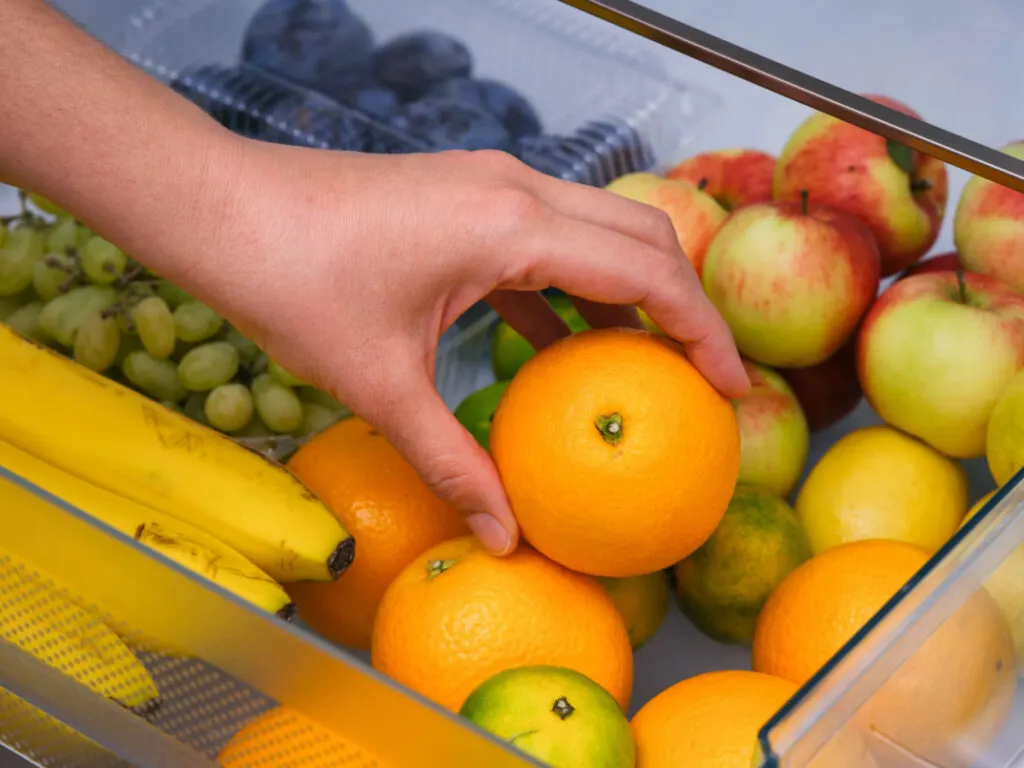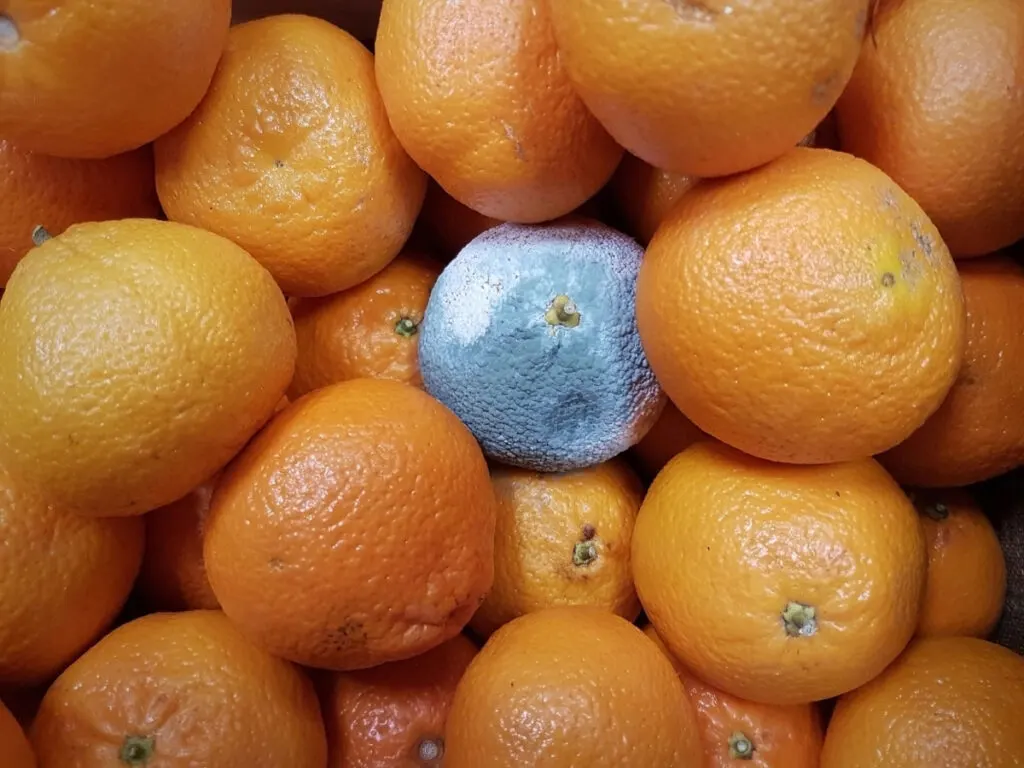Oranges are a very common fruit enjoyed by people all over the world. They are one of the cheapest sources of vitamin C and are also rich in other essential nutrients.
They have outer peels that serve as a protective covering, and while intact, these peels prevent them from spoiling quickly.
However, these protective peels are surprisingly fragile and, as such, can easily get damaged. Also, because of their high moisture content, oranges are highly susceptible to spoilage or decay.
Under normal circumstances, oranges can last up to 10 days at room temperature, up to a month in the fridge, and freezing them will keep them good for up to ten months.
To keep your oranges fresh for longer, you need to know how to store them correctly. There are various ways to do that, each of which will be discussed in this article.
So, let’s dive in!

Pro Tip: When selecting oranges, choose only fresh, firm, and heavy fruit. Do not choose oranges that are discolored, soft, or too ripe.
Table of Contents
How to Store Oranges
Oranges can either be stored at room temperature, in the fridge, or in the freezer.
However, how you store your oranges will be influenced by how long you intend to keep them.
Storage Conditions and Duration of Storage
- At room temperature:
- Whole oranges: 10–14 days.
- Cut oranges: — Few hours
- In the fridge:
- Whole oranges: 3–4 weeks
- Cut oranges: 3–4 days
- In the freezer:
- Whole oranges: 6–10 months
- Cut oranges: 10–12 months
While employing these storage methods, here are some tips to ensure your oranges stay fresh.
Storing Oranges at Room Temperature
To store oranges at room temperature, you need to:
- First, remove the plastic wrapping. This is only applicable if you bought the oranges from a grocery store, and it’s to avoid moisture build-up and allow for better air circulation.
- Arrange the oranges in a single layer in a dry, shallow, breathable container and place them on the countertop.
- Keep them out of high temperatures.
- Check them as often as possible and throw out those that may have gone soft.
Oranges will stay fresh in this condition for about a week or two, depending on the ripeness, but are best consumed within a few days.

Storing Oranges in a Fridge
If you have oranges that will not be consumed within two weeks, you should put them in the fridge to prolong their freshness.
Here’s how to properly store your oranges in the fridge:
For Whole Oranges
- Don’t wash your oranges until you are ready to eat them. Moisture will facilitate bacterial or fungal growth and hasten the spoilage process.
- Put them in a dry, airtight container.
- Keep them in the crisper/humidity drawer of your fridge.
For Cut or Peeled Oranges
Cut oranges don’t have the protective peel or rinds to help slow spoilage. So, you should take extra care to preserve them. Here’s how to store cut oranges:
- First, remove the seeds.
- Then, cover each slice tightly using plastic wrap.
- Next, put them in a dry, airtight container.
- Keep it in the back of your fridge. (Stays good for up to four days)
Can I Store Oranges in the Freezer?
You can store your oranges in different forms in the freezer.
Freezing oranges is the most effective method of long-term storage. The oranges can be preserved for a long time if they are kept constantly frozen at 0°F.
Tips for Storing Oranges in the Freezer
Whole Oranges
For better texture and taste after defrosting, you should freeze oranges whole—peel and all.
To properly freeze whole oranges,
- Clean the oranges thoroughly and properly dry them.
- Place them in a Ziploc bag, deflate as much as possible, and place them in the freezer.
Cut Oranges
Freezing oranges as slices is more effective. However, the taste, flavor, and texture of the fruit can be altered.
To store oranges this way:
- Peel or wash the whole orange thoroughly.
- Properly dry the fruit using a clean paper towel.
- Cut into slices. Remove seeds or pits from the orange slices.
- Spread them out on a tray or lined baking sheet. Ensure they’re evenly spaced.
- Freeze until the slices are solid. This usually takes about four hours. If you’re unsure, just freeze them overnight.
- Once they’re frozen, move the slices to a container, cover them tightly, and return to the freezer.
- Ensure that you do this quickly. Do not allow the frozen oranges to thaw before returning them to the freezer.
Alternatively, you can squeeze the orange juice into ice cube trays and freeze it. The orange juice cubes will last months in the freezer under optimal conditions.

Tips for Better Preserving Your Oranges
- Do not attempt to store oranges that show any sign of damage.
- Check for ripeness. Overripe oranges are more susceptible to spoilage or decay. If you don’t intend to eat the oranges quickly, don’t go for overripe ones.
- Avoid direct sunlight. Oranges last longer in a cool and dry environment.
- Routinely check the stored oranges and throw out those showing signs of spoilage.
- Do not store ripe and unripe oranges together to prevent the ripe ones from causing the unripe ones to spoil quickly.
- Do not stack your oranges in storage. Keep them in one layer to prevent the build-up of heat and moisture.

How to Determine When Oranges Are Bad
Fresh oranges have a firm consistency when examined gently. Changes in texture, color, odor, and taste indicate that your oranges are spoiled.
Some markers to look out for in determining when to throw your oranges away are:
Shriveled Rinds
When oranges begin to spoil, they sometimes lose their freshness and moisture content (the inside dries out); this reflects on the outside as a shriveled peel.
You may not notice any discoloration, but the peel will be wrinkled and feel thin and fragile.
Discoloration
Brown or white patches on the orange are indicative of bacterial growth.
You might want to check for other spoilage markers if you notice this on your orange.
Mold Growth or Mushy Brown Spots on the Rind
If you see green spots or a white haze on the peels of your orange, you might want to consider disposing of it.
Both symptoms are often due to the presence of mold.
The inside of the orange might still appear good, but it is advisable to throw it away.
Foul-Smelling Odor
Fresh oranges generally have a sweet, citrusy scent; however, when they have gone bad, they lose that sweet scent.
If you notice this, toss the whole fruit away.
Bad Taste
Fresh oranges have a sweet and refreshing taste. When they begin to taste bitter or sour, that is an indication that your orange is losing its freshness.
Slimy Peel
A slimy peel is a sign of bacterial growth; this already tells you the inside can’t be good.
If you notice one or more of these markers, you should throw the oranges out immediately.

Conclusion
Oranges are a delicious fruit. Knowing how to properly store your oranges makes them last longer for you to enjoy.
It is also important to do away with them when they begin to spoil so they don’t cause any health problems.
By following the tips shared in this guide, you can properly store oranges and preserve their freshness so that you can enjoy their nutritional benefits for a long time.
Resources
- https://says.com/my/lifestyle/how-to-store-mandarin-oranges-to-keep-them-fresh-longer
- https://www.allrecipes.com/article/how-to-store-oranges/
- https://www.ehow.com/how_7686939_store-oranges-tangerines.html
- https://gingerdivine.com/how-to-tell-if-an-orange-is-bad/
- https://www.stilltasty.com/fooditems/index/17845
- https://www.doesitgobad.com/do-oranges-go-bad
